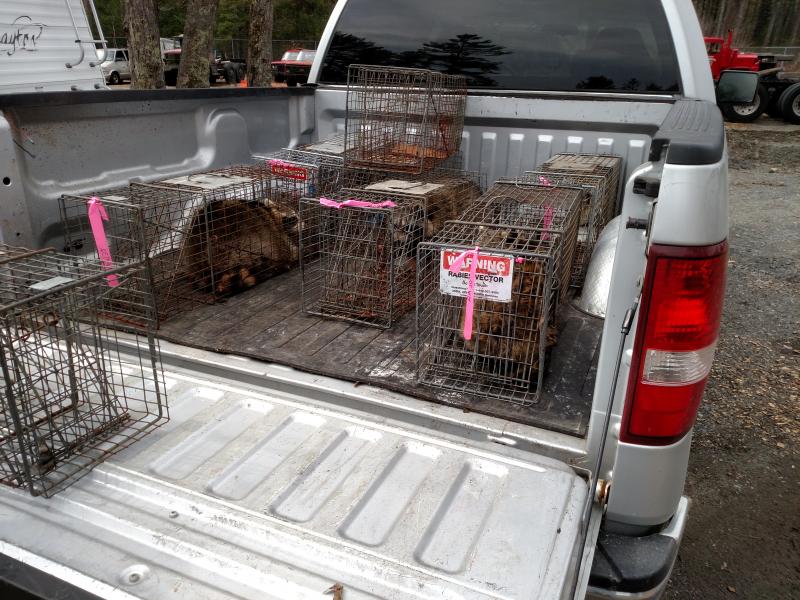Rabies vaccine program returns after 13-year absence
For the first time in 13 years, a renewed initiative will help federal and state officials battle the spread of rabies in towns west of the Cape Cod Canal, including Rochester and Marion.
The United States Department of Agriculture-Wildlife Services, in cooperation with the Cape Cod Rabies Task Force, will continue its Oral Rabies Vaccine Program on April 18. The program is designed to squash a strain of rabies commonly found in raccoons.
Moving the program to the mainland is an attempt to create a larger buffer zone for Cape Cod while also providing vaccinations in more communities.
The task force recently began testing animals in Rochester and Marion, and Rochester Land Trust President David Smith went along for the ride.
Smith accompanied USDA Wildlife Disease Biologist Randy Mickley as he checked live traps set up in the two towns, including some on land trust property.
“It was an interesting experience and I was happy to see the concern these men have for the well-being of the animals,” said Smith.
He said five raccoons were caught in both towns and taken to a mobile lab for processing. Each animal was injected with a sedative. USDA officials then took a blood sample and attached a numbered metal tag to identify the animal before release.
The animals were returned to their original habitats once fully revived.
Now that a baseline has been established in this area, the next phase begins.
Brian Bjorklund, a wildlife/rabies biologist with the USDA, said expanding the vaccine program to mainland communities is an important component to eliminating rabies.
“It’s a good thing we’re able to address the mainland towns now,” Bjorklund said. “Hopefully we can push it back further and create a bigger buffer zone.”
To combat the disease, 72,000 vaccinations, disguised as edible treats, will be distributed off Cape, in the mainland sections of Bourne and Sandwich, in addition to Plymouth, Wareham and portions of Rochester, Marion and Middleboro. Approximately 39,000 pieces of bait will be distributed on Cape Cod.
Bjorklund said residents should be on the look out for the vaccinations and take precautions to keep pets from taking the bait.
The vaccines won’t harm pets if ingested, but they are considered a lost dose for wildlife.
“Every bait that dogs get is one less vaccine available for a raccoon,” Bjorklund said.
The vaccines are sealed inside plastic packets. The packets are wrapped inside bait made of fishmeal. With its distinctive odor, Bjorklund said the bait attracts dogs and cats as well as raccoons. He encouraged dog owners to keep pets on leashes following the distribution of the bait.
Bait will be distributed in Marion on April 19 and in Rochester on April 21.
If anyone finds a bait sample, Bjorklund said it should be picked up using gloves and tossed into the woods or disposed of properly.
If a pet eats the bait, report it to the USDA Wildlife Services by calling 508-476-2715.
In addition to the hand distribution, 48 bait stations on the mainland will be stocked with bait samples. Bjorklund said the stations dispense the bait like “gum ball machines” and are an effective and low cost way to distribute the vaccinations.
Made of plastic pipes, the stations are located in the woods of the mainland communities targeted. Bait stations will be filled on April 18 and monitored for three weeks after that date.
The Cape was free of raccoon rabies until a case was reported in Falmouth in 2004. Soon after, infected animals were discovered as far away as Provincetown.
Karl Von Hone, director of Yarmouth’s Division of Natural Resources, said the Oral Vaccination Program has been instrumental in reducing rabies cases on the Cape.
The first official case of rabies in Massachusetts was reported in 1994.
Since then, the program’s boundary has shifted further west as rabies cases have declined on the outer Cape. Rabies, which is spread by the saliva of infected animals, is nearly 100 percent fatal if not treated before symptoms appear.
“We want everybody to understand the importance of this program,” Von Hone said. “By getting rid of rabies we’re bringing peace of mind to many people and pet owners.”















